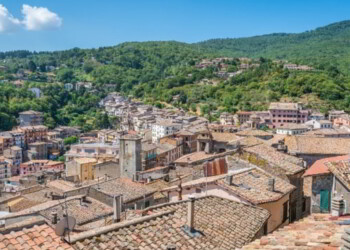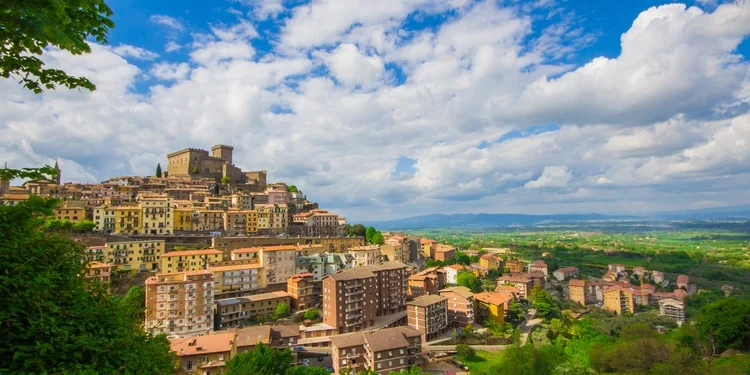When Peta Lowry looks from her window, she sees a beautiful valley and the Apennine Mountains…
“I pinch myself looking at the view and think, ‘Wow, I am in Italy!’ I still can’t believe we are actually living here,” says Peta.
Since 2009, Peta, 54, and her husband Ian Sinclair, 63, have been living in the beautiful hilltop Italian town of Soriano nel Cimino, 50 miles from Rome.
 Rich in history, the area is known for its Etruscan ruins and hot springs.
Rich in history, the area is known for its Etruscan ruins and hot springs.
Olive and hazelnut groves surround the town, and the forested hills with their many rivers and springs provide a refreshing escape during hot summer months. Romans have been coming here since ancient times in search of fresh air.
The town is also famous for its chestnut festival celebrated in October with a medieval parade, music, historic reenactments, traditional feasts, and lots of roasted chestnuts.
“When we moved here, the original plan was to stay for six months or two years maximum. Eight years later, we are still here,” says Peta.
Originally from Australia, Peta and Ian made the move to provide bilingual education for their now teenage sons.
“Italian is the second most commonly spoken second language in Australia after Chinese, so we thought our sons would be able to use their second language when they got back,” explains Peta.
The couple thoroughly planned and prepared for their trip…
“It took us seven years to budget, plan, and save money for our two-year trip. We sold our house to get enough money to come over,” says Peta.
“Then, when we realized that it could be a longer-term thing, we thought we’d better start making money because we had only a certain amount of savings.
Starting A Business In Italy
Peta used her 30 years of experience and contacts in the corporate world to start a business providing consulting services to Italians interested in relocating Down Under and to Australians looking to move to Italy.
When people began coming to the couple for help practicing their English, a second business idea was born.
Peta and Ian set up English services centers offering structured English study and translation services. Ian is in charge of the five centers in the nearby small towns where 100 students are enrolled.
The businesses in Italy have not only provided Peta and her family with a steady income, but they have also allowed her to qualify for an autonomous worker visa (lavoro autonomo).
“I was the first Australian to get a lavoro autonomo visa here,” Peta explains. “It hasn’t been easy. We had to start from nothing. But now we are at the point where we are getting a lot of requests. It is all word of mouth. Our happy clients recommend us. Every day there is some new opportunity.”
Peta admits that speaking Italian has been a challenge and that one of her main regrets is not learning the language before coming to Italy. However, the language hurdle has never stopped her from finding business opportunities.
“I don’t speak fluent Italian but I have enough to get by. It’s surprising how many Italians understand English when you speak slowly.”
Language barrier aside, Peta says the lifestyle transition was very easy.
“My husband and I spent nine weeks of our honeymoon touring Italy on motorbike. We had a good connection with Italy and made friends quickly.”
Living In Italy Is Easy On The Pocketbook Too…
“Back home we would easily spend hundreds of dollars a week on groceries,” says Peta. “Here we average about 50 euros per week… less than half what we used to.
“Monthly we spend around 1,200 euros, including rent, utilities, phones, internet, car, fuel, and groceries.”
Going out for a meal is affordable, too.
“Our favorite restaurant is Gigi’s Pizzeria, where we get great pizzas (either eat-in or takeaway) for four of us for 12 euros. We have our daily morning tea at one of our three local cafés. My husband’s caffè latte is 80 cents, and my pot of tea is 1 euro.”
Peta is happy that their small businesses have enabled them to live in Italy indefinitely and to become their own bosses.
“I love the freedom to choose to do what we want and to be flexible with our time. If I need to take time off, no one is asking why or how long or when I’ll be back to work,” says Peta. “It is very different from my experience in the corporate world.
“For us, life here in Italy is as good as we imagine life gets.”
Sincerely,
Anna Lebedeva
Contributor, Overseas Living Letter










